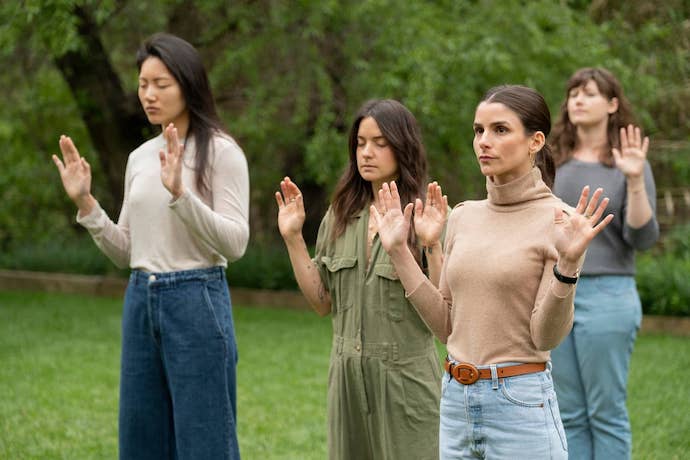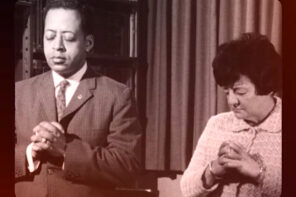It is perhaps unsurprisingly rare for anyone to talk about Goop, New Agers, and the world of wellness as offering trenchant critiques of neoliberal capitalism. But let’s try.
Netflix’s The Goop Lab (TGL), for the uninitiated (or those deaf to the waterfall of controversy surrounding it), is a series that features employees of actress-turned-New-Age-entrepreneur Gwenyth Paltrow’s company, Goop—as well as Paltrow herself—exploring a series of alternative “healing modalities,” including “psychedelics, cold therapy, female pleasure, anti-aging, energy healing, and psychics,” as noted by The Cut’s Amanda Arnold.
Many critics have, of course, accused TGL and Goop itself of being a cynical cash-grab; of peddling scientifically spurious—even dangerous—health tips; and, perhaps most succinctly, in the words of one woman interviewed on the show, of being “Woo-woo bullshit … [just] a bunch of privileged people in LA” doing empty privileged-people things.
But if we can set aside, for a moment, the valid criticisms of the legitimacy of the healing modalities depicted and the obvious conflict of interest, it may come as a surprise to discover what TGL and Goop can tell us about ourselves
There’s a tragic aspect to TGL. Beyond the high production values and the glitz, it’s essentially a show about women who, on the surface, “have it all,” but who also have the sense that something is so deeply wrong in their lives and the world around them that they’re moved to pursue controversial, and often expensive, quests for healing.
Across the show’s 6-episode run, the various interview subjects—from Goop employees, to open-minded laypeople, to healing experts—return over and over again to a strikingly similar point: our society faces (in Paltrow’s words) a “systemic, cultural lack of connection.” In the very first episode, Paltrow sets the tone, musing that, “If everybody felt connected, they would understand that I, as well, have had incredibly painful and traumatic experiences. I have a lot of trauma in my childhood and being the person that people perceive me to be is inherently traumatic.”
Later in that same episode a psychedelic therapist makes a similar point:
“I have a private practice where I see wealthy clients, poor clients … and within a few sessions everyone’s talking about relationships and this need for connection. … we’re all suffering to some extent and we’re on this journey of healing.”
TGL set itself up as a way for participants to speak to this lack; to call out the problems they see and experience in our world, and to reach out and grasp for connection.
In “The Health-Span Plan, an episode focused on aging, a host of Goop staffers (notably all women) sit around a table, discussing their fears and insecurities. In a lingering shot, one staffer declares herself “horrified” of aging “on [her] face,” because “for a long time it was my currency, for relationships, for doing well in high school, for getting great jobs.”
Beauty, in other words, is a commodity, a measure of her worth. Aging would mean not just the loss of beauty, but the loss of status and economic opportunity as well. Lurking just beneath TGL’s polished veneer, lie a host of half-articulated, but trenchant, critiques of our vapid cultural condition, and a potential first step toward actual liberation. A first step TGL on its own, sadly, is unlikely to inspire.
The new ‘New Age’
The roots of Goop lie in utopian dreams of other ways of being; the same set of impulses that drove the idea of universal human rights, jobs for all, communes, racially-integrated worlds, and both spiritual and this-worldly democracy. During the 60s and 70s, the intertwined movements for Black power, gay liberation and women’s liberation rose to prominence, gaining hundreds of thousands of adherents across the country, all calling in cacophonous unison for the basic rights to dignity and self-ownership, and playing a critical role in the creation of a massive coalition that came to be dubbed the “New Left.”
Alongside these movements, and the “cultural revolution” that engulfed the era, emerged a massive religious movement that came to be called the “New Age.” Though this movement had long roots in American history, it had largely dwindled in adherents since the 1920s, but was able to ride to national prominence on the waves of disaffected baby boomers, seeking alternative ways of being.
At the same time, the roots of Goop also lie in what happened as the 70s sputtered into the 80s: just as women and non-white workers had successfully fought their way into professions and stable jobs they had largely been excluded from, corporations appealed to their “rights” to destroy unions, to lower trade barriers (and corporate taxes), to curtail job security, and to outsource once-stable, working class jobs around the world.
As world-weary “New Agers” became cynical and dejected, turning away from politics to become entrepreneurs, libertarians and lifestyle gurus, a new “neo-liberal” world was emerging around them. In this world, a small cadre of entrepreneurs and corporate overlords (a teensy bit more multicultural and multi-gendered than before) win massively, pay close to no taxes, and take little to no responsibility for the world they’re damaging, while the rest of us must make do with less and less.
Goop is a product of—and an amazing look into—the inner world of the winners of this shake-up. The company is made up of professional, successful people, working in a wildly successful start-up, allowed to take part in a globally-syndicated documentary series, all while living in and around Los Angeles, one of the wealthiest areas in the world’s wealthiest country. And they are all—fundamentally—miserable. As Elisa Loehnen, Goop Chief Content Officer, says in the first episode, “everyone here at goop is a deeply successful person, and yet they are all carrying a tremendous amount of pain and loss.”
Though they don’t use these words, the men and women on TGL almost universally dare to ask a fundamental question of life under neoliberal capitalism: what is health in a world where we are ever more alienated from our selves and the worlds around us, and where everything (even our face) has become a commodity?
We should all have the courage of Goopers and the people who unabashedly love TGL. It takes gall to pursue a path often disrespected and mocked by the wider society, and it takes honesty to admit to feeling disconnected, lost, and alienated. It’s brave to dare to look stupid, earnest and credulous (and even to orgasm) on a show that will be watched by many hundreds of thousands if not millions. And trust me, they all know that this is how they will be seen.
Their impulses make sense: to fight alienation, TGL, much like the New Left before it, appeals to a language of liberation. In the lead-in to every episode, a confident Paltrow declares, much like the “hippies” before her, that her goal is “total freedom.” Swimming in freezing water promises to liberate our immune systems; female masturbation promises to liberate our bodies; and psychedelics, energy healing and intuition promise to liberate our consciousness.
It is, however, its particular conception of liberation and vision of healing, that separates TGL from the Goopiest of New Age Socialists and the New Left. The series is never quite clear on the nature of the freedom it wants: freedom for what or from what? Because they fail to answer these questions, Goopers fall back on the exact values and structures that caused the alienation in the first place. Freedom becomes a thing that you can either buy, or, lacking that, lead you toward an ever-receding target that tends to promote an unending, anti-political, winding inward pursuit of health and wellbeing. Thus does Paltrow declare in the episode on aging, “I’ve tried a million, different crazy fasts and diets … but this one was pretty incredible.” Freedom without direction, however, very quickly becomes alienation.
Freedom, health, and liberation… sort of
For Goopers (or at least for Paltrow and those who share her views), freedom is both completely subjective and individual; it’s something that doesn’t necessarily connect us to the world around us. In the third episode, “The Pleasure Is Ours,” Goopers openly discuss issues of feminism and the radical power of self-knowledge. As the episode’s expert declares, “When you’re in touch with your body and you love your body and you can give yourself an orgasm, you’re independent. You know who you are. You know what you want. We’re very dangerous when we’re knowledgeable.”
The question that this expert doesn’t ask on screen, however, is to what end? What are we using our independence and our knowledge for? Independence is absolutely dangerous: it can either lead us to questioning the foundations of what we consider to be normal and acceptable, or to reveling in alienation and reinforcing the status quo. Freedom, health, and liberation are excellent goals, but how “total” are they when they’re not conceived of in both individual and collective terms?
Nowhere are the internal contradictions of TGL more apparent than in the frankly jarring episode on aging. In this episode, after a candid discussion of fears of growing old (which includes the aforementioned comment from the woman afraid of losing her facial “currency”) the show cuts to a series of expensive, invasive and spurious anti-aging treatments, including injecting one’s blood plasma into one’s face, injecting strings of collagen into one’s cheeks, as well as a series of diets aimed at decreasing one’s “biological age.” After implying that our cultural obsession with youth and beauty are bullshit, in other words, TGL essentially takes that obsession as a given and encourages a “more natural way” of giving in to them.
In the last two episodes, “The Energy Experience” and “Are You Intuit?” we learn both that “our consciousness actually shifts or alters in some way shape or form physical reality,” and that “we’re all born hardwired to each other and the other side.” Psychic energy, we learn, from medium Laura Lynn Jackson, is “a gift that belongs to all of us, but some of us train ourselves so much out of it that we don’t honor it and we don’t engage in it.” Moreover, she continues, “we are all a lot more in tune with one another than we think we are. It’s amazing how we can, like, connect with each other if we just put in a little more intention and effort.”
Beyond the tragedy of alienation and the problematic solutions provided, we can find some hope in TGL—or at least in the impulses behind it. If Goop theology teaches that we’re all fundamentally interconnected and that we have the ability to alter our realities, then a theology of collective liberation could be a natural progression. TGL could encourage a way out of our alienation, not through the right purchases, but through a combination of collective action and individual healing. TGL could lead us to a politics of “integrated” revolution, if you will, that would combat both the spiritual and material alienation of neoliberalism. But, ultimately, TGL and Goop don’t appear to be anywhere close to this path.
In the season’s semi-tragic final scene, Paltrow playfully asks a psychic, “who is going to be president in 2020?” In the background we can hear Paltrow’s office manager say, wistfully, “I know,” as we fade to black over laughter.





